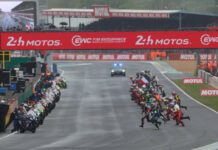ALSTARE’S BIOFUEL BIKE DEBUTS AT MONZA Alstare is sensitive to the environmental problems caused by the continuing consumption of fossil fuels affecting the earth’s climate control. We are aware that it is inevitable and urgent now for the world to reduce CO2 carbon emissions in the atmosphere and to replace the consumption of polluting energies with clean and renewable sources. Therefore, since last year, Alstare began working on the development of small sized engines – such as in motorcycles and ATVs – using biofuel. Such a project is the result of a synergy between Alstare’s technical and intellectual resources and the experience and the support of Japanese manufacturer Suzuki and Magneti Marelli, Alstare’s race team partners for several years. In our research into new ‘bio-engines’, the total process is being improved from the seed to the vehicle. The efficiency of biofuels starts first with the adaptation of the engine to its fuel and not with the adaptation of the fuel to a classic engine. The first step achieved by Alstare was the development of an agricultural ATV using fuel consisting of 85% bioethanol and 15% petrol (E85). The evolution of a traditional engine into an adapted bio-ATV was entirely carried out by Alstare’s technicians in its Belgian workshop. Now, after months of research and experimentation, Alstare proudly unveils its prototype of a Suzuki GSX-R 1000 Superstock bike running with 85% of biofuel In fact, Alstare’s technicians have been recently working on the application of bio-engine technology to ‘racing’ motorcycles. This task has been successfully achieved and, during the World Superbike racing weekend in Monza, Alstare will present its ‘bio-motorbike’. Well-known bike tester Alan Cathcart will evaluate the performance of the machine on the legendary Monza circuit on Saturday 11th May between 13.00 and 13.20. Thanks to this achievement, Alstare is a pioneer in the development of racing engines using biofuel. The application of such technology in motor sports responds to the growing concern of the motorcycle manufacturers with regard to the problems of pollution and climate change. Responding to people’s growing awareness in environmental issues, the European Union is considering legislation in the near future obliging Member States to increase the proportion of biofuel in their markets (Directive 2003/30/EC). Alstare’s future research will be focused on adapting a traditional engine to biodiesel. Such research will take at least a year to complete and will involve different areas of study including the evaluation of the costs for the production, development and the technical modifications necessary in order to obtain a profitable result in terms of performance and fuel consumption. Alstare is proud of promoting such a project, which could actually contribute to the economical and social growth of agricultural regions in developing countries. Biodiesel vehicles represent a real alternative for the countries that cannot afford to depend on petrol imports. In particular, rural communities will finally be able to work with biodiesel agricultural ATVs which are cheaper, handy, easy to drive and do not pollute nor ruin the land.
Just In Time To Add To The “Bio-fuel Causes Starvation” Debate, A Race Team Debuts An E85 Racebike…
Just In Time To Add To The “Bio-fuel Causes Starvation” Debate, A Race Team Debuts An E85 Racebike…
© 2008, Roadracing World Publishing, Inc.






